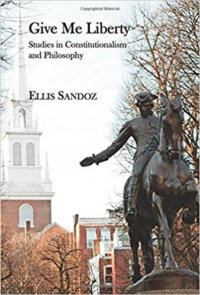Give Me Liberty: Studies in Constitutionalism and Philosophy

Give Me Liberty: Studies in Constitutionalism and Philosophy. Ellis Sandoz. St. Augustine’s Press, 2013.
Ellis Sandoz’s Give Me Liberty: Studies in Constitutionalism and Philosophy is a collection of nine essays: four about American history and politics, four about the philosophy of Eric Voegelin, and a concluding essay about liberty. Two of the essays have been previously published elsewhere – one about religion and the American Founding and the other about Voegelin’s understanding of the vocation of philosophy – with the rest of them as original pieces. The book is really a two-for-one sale with the first half about the United States and the second half about Eric Voegelin. Although each chapter is insightful about the nature and history of philosophy and politics, the book would have been more coherent if there were an introduction or chapter that bridged these two topics of the American Founding and Eric Voegelin.
The first chapter, “The Free Man and the Free Government in Political Philosophy,” uncovers the philosophical, legal, and historical roots of the American conception of the individual as one who is free. The Magna Carta and the works of Plato, Aristotle, Aquinas, Edward Coke, John Fortescue, Richard Hooker, John Locke, and Edmund Burke all contribute to the American Founders’ understanding of the individual as one who participates in a reality that is both rational and divine while seeking freedom. Individuals are freest when serving truth, justice, and the common good. Sandoz argues that the American Founders subscribed to these principles and sought to create a new type of political and spiritual community based on consent.
The second chapter, “Religion and the American Founding,” continues Sandoz’s account of this new type of political community based on the principles of Christianity (22). While the American Founders relied on Aristotle and Cicero, they understood St. Paul’s maxim that “all have sinned, and come short of the glory of God” (31; Rom 3:23). The result was not political utopias but constitutional compromises that have endured since the Founding.
“So What’s the Difference? The Debate over American Independence” is an examination why the Americans revolted against their mother country. According to Sandoz, the British had abandoned Old Whig principles in favor of imperial hubris and libido dominandi. The American Revolution therefore was one aimed at justice and personal and corporate liberty and not, as some have suspected, independence at any cost.
After examining the American Founding, Sandoz next turns to contemporary America in “The United States in the World Arena: The 9/11 Era and President Bush II.” American foreign policy should serve liberty and justice as best as the nation can while defending its national and security interests. Sandoz reluctantly supports Bush’s foreign policy of democratization – the liberty of the United States depends upon the liberty of other people abroad – because there is no viable alternative at this moment. For Sandoz, it is better to have a bold policy rather than not have one at all.
Chapter five, “Eric Voegelin as Master Teacher,” takes a detour from American history and politics and instead focuses on the person whose work undergirds Sandoz’s analysis of America. In this chapter, Sandoz highlights the principles that Voeglein followed as a teacher, such as an effective use of chalkboard diagrams, encouraged students to use their own common sense, and profess the truth, which included the divine, to his students.
Sandoz continues with his account of Voegelin in the sixth chapter, “What is a Mystic Philosopher and Why It Matters.” At his core, Voegelin was a mystic who sought to convey truth in public: philosophers are to represent the truth and order in his/her society and to be a rallying point of representative authority. In chapter seven, “Mysticism and Politics in Voegelin’s Philosophy,” Sandoz explores the political dimension of mysticism as a form of resistance against evil and injustice, of which Voegelin is an example, having published two books against the Nazi race ideology and consequently forced to flee Vienna.
Chapter eight, “The Philosopher’s Vocation: The Voegelinian Paradigm,” concludes Sandoz’s study of Voegelin. Philosophy for Voegelin was a type to be open to the whole of reality, including its truth. The philosopher can recognize his or her authority and assert it in an environment infested with dubious ideologies. He or she can be a spokesperson for divine truth for society that needs to be spiritually restored.
The final chapter, “Conclusion: The Politics of Liberty,” is Sandoz’s account of freedom as grounded in divine truth. He shows how the civic consciousness of the American Revolution is rooted in the theological teachings of the medieval and early modern eras where Christ is freedom from the law and the gift of righteousness through divine grace. Sandoz concludes that Americans must remain “eternally vigilant” to maintain their freedom against movements and ideologies that seek to dislodge the divine from the American regime.
Give Me Liberty: Studies in Constitutionalism and Philosophy is an antidote to those who believe the American Founding was primarily an enlightened or rational one and illuminates why scholars, politicians, and the public need to take religion seriously to understand who we are as a people if we wish to protect our liberty. The book also provides an account of philosophy that is mystical instead of rational and where the purpose of philosopher is to understand rather than master reality. Such a perspective on both American history and philosophy is needed today not only to make us see ourselves and our country in a new light but also possibly correct some of the missteps we have taken as a nation.
Also available is Rouven Steeves’ review here.




